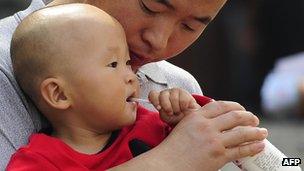Baby milk rationed in UK over China export fear
- Published

Retailers in the UK are rationing sales of powdered baby milk because of a surge in demand in China.
Danone, the manufacturer of Aptamil and Cow and Gate baby milk powder, said most supermarkets were introducing a restriction of two cans per customer.
It said the limit was to prevent some individuals from bulk-buying baby milk for "unofficial exports".
Retailers were also capping sales of Nestle's SMA milk, despite the company saying there were no stock shortages.
Danone said in a statement: "We understand that the increased demand is being fuelled by unofficial exports to China to satisfy the needs of parents who want Western brands for their babies."
Chinese thirst
"We would like to apologise to parents for any inconvenience caused by this limit. We know that most parents only buy one pack at a time, so we hope that the impact of this limit on UK parents will be minimal," it added.
Supermarkets Asda, Sainsbury's, Tesco and Morrisons said the purchase of certain brands would be limited to two units per customer per day.
Foreign-made baby formula is popular in China, especially since a locally-manufactured formula laced with the industrial chemical melamine killed six infants in 2008 and caused another 300,000 to fall ill.
Earlier this year, shops in Australia were forced to restrict sales of infant formula, as Chinese customers and tourists bought them in bulk to send them home or to sell them online.
Authorities in Hong Kong also introduced restrictions in February to prevent shortages, banning travellers from leaving the territory with more than 1.8kg (4lb) of formula. Last month, 10 people were arrested there for trying to smuggle more than the allowed amount into mainland China.
Danone said it was taking action to respond to the shortfall in the UK, including increasing production of milk, which means extra supplies of all its brands are arriving every week, according to BBC business correspondent Emma Simpson.
Boosting production
Danone is also increasing production and supplies of its brands that are already available in China, in order to meet demand there.
But it added: "If parents are unable to find their baby's usual brand of milk, we recommend they try another local store or revisit the store on another occasion."
Richard Dodd, head of media and campaigns at the British Retail Consortium, said: "A number of retailers are limiting the amount of baby milk that can be bought by any one customer.
"Retailers are taking this precautionary step to ensure stocks continue to be available to everyone wanting baby milk," he added.
However, Nestle insisted there were no shortages of its formula milk available to retailers.
The company said: "We do not have any evidence of bulk purchase of SMA for export, and we are in the process of contacting all our retail customers to confirm this, and to notify them that we do not have - and do not anticipate - any stock issues for powdered infant milks.
We would like to reassure our consumers that we are not seeking to impose any limits on the sale of our formula, and any decision to do so is at the sole discretion of the retailer. Contrary to reports, Nestle UK has never requested that retailers limit the supply of SMA powdered infant milks sold to consumers."
- Published1 March 2013
- Published8 January 2013
- Published20 September 2010